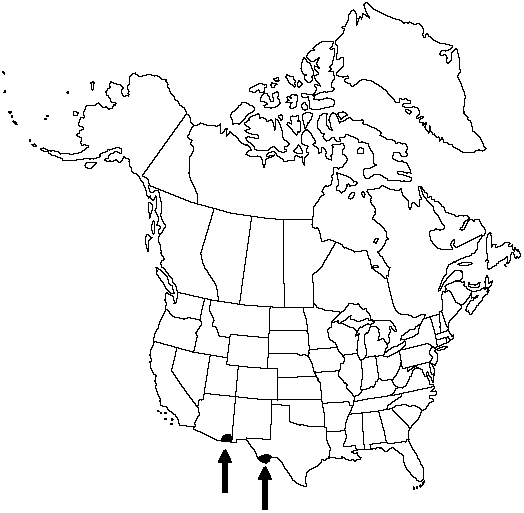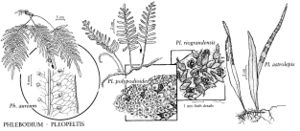Difference between revisions of "Pleopeltis riograndensis"
in Windham, Contr. Univ. Michigan Herb. 19: 46. 1993.
FNA>Volume Importer |
imported>Volume Importer |
||
| (7 intermediate revisions by 2 users not shown) | |||
| Line 1: | Line 1: | ||
{{Treatment/ID | {{Treatment/ID | ||
|accepted_name=Pleopeltis riograndensis | |accepted_name=Pleopeltis riograndensis | ||
| − | |accepted_authority=(T. Wendt) E. G. Andrews & | + | |accepted_authority=(T. Wendt) E. G. Andrews & Windham |
|publications={{Treatment/Publication | |publications={{Treatment/Publication | ||
| − | |title=in Windham,Contr. Univ. Michigan Herb. | + | |title=in Windham, Contr. Univ. Michigan Herb. |
|place=19: 46. 1993 | |place=19: 46. 1993 | ||
|year=1993 | |year=1993 | ||
}} | }} | ||
|common_names=Rio Grande scaly polypody | |common_names=Rio Grande scaly polypody | ||
| − | |basionyms={{Treatment/ID/ | + | |basionyms={{Treatment/ID/Basionym |
|name=Polypodium thyssanolepis var. riograndense | |name=Polypodium thyssanolepis var. riograndense | ||
|authority=T. Wendt | |authority=T. Wendt | ||
| + | |rank=variety | ||
| + | |publication_title=Amer. Fern J. | ||
| + | |publication_place=70: 6. 1980 | ||
}} | }} | ||
|synonyms= | |synonyms= | ||
| Line 20: | Line 23: | ||
}}<!-- | }}<!-- | ||
| − | --><span class="statement" id="st- | + | --><span class="statement" id="st-undefined" data-properties=""><b>Stems </b>short-creeping, sparingly branched, 2–3 mm diam.; scales subulate to lanceolate-acuminate, centrally clathrate with cell luminae large and clear, surfaces glabrous, margins lacerate-ciliate. <b>Leaves</b> to 20 cm, strongly hygroscopic. <b>Petiole</b> grooved, otherwise round in cross section, sparsely scaly; scales rarely overlapping, margins denticulate to ciliate. <b>Blade</b> triangular-oblong to ovate, deeply pinnatifid, to 5 cm wide, moderately scaly abaxially, glabrous adaxially; scales concolored to obscurely bicolored, usually dark reddish brown throughout, broadly ovate-lanceolate, clathrate, more than 0.5 mm wide, margins fringed-ciliate. <b>Venation</b> mostly free with occasional areoles, never more than 1 included veinlet in fertile areoles. <b>Sori</b> round, discrete, surficial to shallowly embossed, soral scales attached at periphery of receptacle. <b>Spores</b> smooth with scattered spheric deposits on surface, 60–74 µm. <b>2n</b> = 148.</span><!-- |
-->{{Treatment/Body | -->{{Treatment/Body | ||
| + | |phenology=Sporulating summer–fall. | ||
|habitat=Growing on rocky slopes and ledges, and in crevices, usually in moist, shaded canyons | |habitat=Growing on rocky slopes and ledges, and in crevices, usually in moist, shaded canyons | ||
|elevation=1500–2500 m | |elevation=1500–2500 m | ||
|distribution=Ariz.;Tex.;n Mexico. | |distribution=Ariz.;Tex.;n Mexico. | ||
| − | |discussion=<p>In the past Pleopeltis riograndensis has been treated as a variety of P. thyssanolepis, but it differs from the latter species in that the petiole and leaf are only sparsely scaly rather than densely so, the blade scales are mostly ovate or ovate-lanceolate rather than nearly spheric, the venation is mostly free rather than mostly areolate, and the basal segments of the blade are alternate rather than opposite to nearly opposite.</p> | + | |discussion=<p>In the past <i>Pleopeltis riograndensis</i> has been treated as a variety of P. thyssanolepis, but it differs from the latter species in that the petiole and leaf are only sparsely scaly rather than densely so, the blade scales are mostly ovate or ovate-lanceolate rather than nearly spheric, the venation is mostly free rather than mostly areolate, and the basal segments of the blade are alternate rather than opposite to nearly opposite.</p> |
|tables= | |tables= | ||
|references= | |references= | ||
| Line 35: | Line 39: | ||
-->{{#Taxon: | -->{{#Taxon: | ||
name=Pleopeltis riograndensis | name=Pleopeltis riograndensis | ||
| − | + | |authority=(T. Wendt) E. G. Andrews & Windham | |
| − | |authority=(T. Wendt) E. G. Andrews & | ||
|rank=species | |rank=species | ||
|parent rank=genus | |parent rank=genus | ||
| Line 42: | Line 45: | ||
|basionyms=Polypodium thyssanolepis var. riograndense | |basionyms=Polypodium thyssanolepis var. riograndense | ||
|family=Polypodiaceae | |family=Polypodiaceae | ||
| + | |phenology=Sporulating summer–fall. | ||
|habitat=Growing on rocky slopes and ledges, and in crevices, usually in moist, shaded canyons | |habitat=Growing on rocky slopes and ledges, and in crevices, usually in moist, shaded canyons | ||
|elevation=1500–2500 m | |elevation=1500–2500 m | ||
|distribution=Ariz.;Tex.;n Mexico. | |distribution=Ariz.;Tex.;n Mexico. | ||
|reference=None | |reference=None | ||
| − | |publication title=in Windham,Contr. Univ. Michigan Herb. | + | |publication title=in Windham, Contr. Univ. Michigan Herb. |
|publication year=1993 | |publication year=1993 | ||
|special status= | |special status= | ||
| − | |source xml=https:// | + | |source xml=https://bitbucket.org/aafc-mbb/fna-data-curation/src/2e0870ddd59836b60bcf96646a41e87ea5a5943a/coarse_grained_fna_xml/V2/V2_664.xml |
|genus=Pleopeltis | |genus=Pleopeltis | ||
|species=Pleopeltis riograndensis | |species=Pleopeltis riograndensis | ||
| − | |||
| − | |||
| − | |||
| − | |||
| − | |||
| − | |||
| − | |||
| − | |||
| − | |||
| − | |||
| − | |||
| − | |||
| − | |||
| − | |||
| − | |||
| − | |||
| − | |||
| − | |||
| − | |||
| − | |||
| − | |||
| − | |||
| − | |||
| − | |||
| − | |||
| − | |||
| − | |||
| − | |||
| − | |||
| − | |||
| − | |||
| − | |||
}}<!-- | }}<!-- | ||
-->[[Category:Treatment]][[Category:Pleopeltis]] | -->[[Category:Treatment]][[Category:Pleopeltis]] | ||
Latest revision as of 20:24, 5 November 2020
Stems short-creeping, sparingly branched, 2–3 mm diam.; scales subulate to lanceolate-acuminate, centrally clathrate with cell luminae large and clear, surfaces glabrous, margins lacerate-ciliate. Leaves to 20 cm, strongly hygroscopic. Petiole grooved, otherwise round in cross section, sparsely scaly; scales rarely overlapping, margins denticulate to ciliate. Blade triangular-oblong to ovate, deeply pinnatifid, to 5 cm wide, moderately scaly abaxially, glabrous adaxially; scales concolored to obscurely bicolored, usually dark reddish brown throughout, broadly ovate-lanceolate, clathrate, more than 0.5 mm wide, margins fringed-ciliate. Venation mostly free with occasional areoles, never more than 1 included veinlet in fertile areoles. Sori round, discrete, surficial to shallowly embossed, soral scales attached at periphery of receptacle. Spores smooth with scattered spheric deposits on surface, 60–74 µm. 2n = 148.
Phenology: Sporulating summer–fall.
Habitat: Growing on rocky slopes and ledges, and in crevices, usually in moist, shaded canyons
Elevation: 1500–2500 m
Distribution

Ariz., Tex., n Mexico.
Discussion
In the past Pleopeltis riograndensis has been treated as a variety of P. thyssanolepis, but it differs from the latter species in that the petiole and leaf are only sparsely scaly rather than densely so, the blade scales are mostly ovate or ovate-lanceolate rather than nearly spheric, the venation is mostly free rather than mostly areolate, and the basal segments of the blade are alternate rather than opposite to nearly opposite.
Selected References
None.
